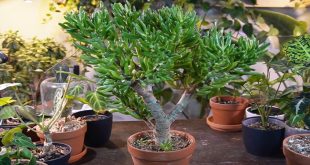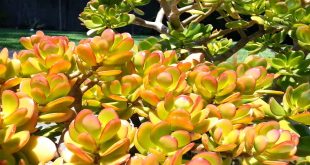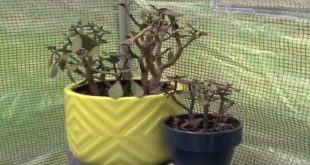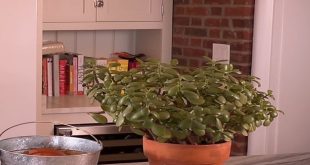Yes, jade plants leaves are toxic to dogs. Jade plants contain a substance called bufadienolides, which can cause vomiting, diarrhea, and other digestive issues in dogs.
In severe cases, it can even lead to abnormal heart rate and symptoms of poisoning. Therefore, it is important to keep jade plants out of reach of dogs and to seek immediate veterinary attention if your dog ingests any part of the plant.
Unintentional ingestion of jade plants can be dangerous to your dog’s health and well-being.
Are Jade Plants Toxic To Dogs?
Jade plants, also known as crassula ovata or money plants, are popular houseplants known for their unique round leaves and easy care requirements. While they may be aesthetically pleasing and add a touch of green to your home, it’s essential to consider the safety of your furry friends.
Dogs are curious creatures and may be inclined to explore their surroundings, including houseplants. In this section, we will discuss whether jade plants are toxic to dogs, the symptoms of jade plant poisoning in dogs, and an overview of common houseplants that are toxic to dogs.
Overview Of Common Houseplants Toxic To Dogs:
- Many common houseplants found in households can be toxic to dogs if ingested.
- Some common houseplants toxic to dogs include lilies, aloe vera, pothos, philodendrons, and jade plants.
- It’s important to research and identify the toxicity levels of the plants in your home to ensure your dog’s safety.
Discussion Of Jade Plants And Their Toxicity:
- Jade plants, specifically the leaves and stems, are considered toxic to dogs.
- The toxic component in jade plants is a substance called bufadienolides, which can cause vomiting, diarrhea, and other gastrointestinal issues in dogs.
- Ingesting larger quantities of jade plants can lead to more severe symptoms such as depression, low heart rate, and even heart arrhythmias.
Symptoms Of Jade Plant Poisoning In Dogs:
- If a dog ingests a jade plant or its parts, they may display symptoms such as vomiting, diarrhea, and drooling.
- Other symptoms include depression, lethargy, loss of appetite, and stomach discomfort.
- In severe cases, jade plant poisoning can lead to changes in heart rate, abnormal heart rhythms, and even cardiac arrest.
Remember, if you suspect your dog has ingested a toxic plant such as a jade plant, it’s crucial to seek immediate veterinary care. The veterinarian will be able to assess the situation, provide appropriate treatment, and ensure the well-being of your furry friend.
Keep your home safe for your pets by either placing these toxic plants out of their reach or opting for pet-friendly houseplants.
Identifying Jade Plants
Are you a dog lover who also enjoys caring for houseplants? If so, you may be wondering whether jade plants are safe for your furry friends. In this section, we will dive into the world of jade plants and help you identify these beautiful succulents.
By understanding their key characteristics, you can ensure the well-being of both your beloved plants and your four-legged companions.
Visual Description Of Jade Plants
Jade plants, scientifically known as crassula ovata, are popular choices for indoor gardening due to their attractive appearance and low maintenance needs. Here’s what you need to know to visually identify jade plants:
- Jade plants are small, upright, and bushy succulents that can reach a height of two to six feet when fully mature.
- Their thick stems and branches are often described as resembling the shape of a mini tree trunk.
- The leaves of jade plants are fleshy and oval-shaped, with a glossy texture. They are typically a vibrant deep green color, but some varieties may have a slight red or yellow tinge.
- As jade plants age, their branches become woody and develop a beige-brown bark-like texture.
- These succulents feature clusters of tiny star-shaped flowers that range in color from pale pink to white.
Identifying characteristics of jade plants are essential for ensuring you bring the right plant into your home. Let’s explore some key points to help you correctly identify these beautiful succulents.
Key Characteristics For Identification
When it comes to identifying jade plants, be on the lookout for these distinguishing features:
- Leaf shape and color: The thick, oval-shaped leaves of jade plants have a glossy, deep green color. Some varieties may have a slight red or yellow hue.
- Texture: Jade plant leaves have a smooth, shiny texture that feels fleshy when touched.
- Growth habit: These succulents have an upright growth habit and develop bushy, tree-like forms as they mature.
- Stem color and texture: Young jade plant stems are green and pliable, while mature stems become woody and develop a beige-brown bark-like texture.
- Flower clusters: Jade plants produce small, star-shaped flowers in clusters. The flowers can vary in color from pale pink to white.
By keeping these key characteristics in mind, you’ll have the confidence to distinguish jade plants from other succulents and ensure a safe environment for your furry friends.
Remember to always double-check the identification of an unknown plant before introducing it into your home. It’s better to be safe than sorry when it comes to the well-being of your beloved pets.
The Chemical Responsible For Toxicity
Jade plants, also known as crassula ovata, are a popular choice for houseplants due to their attractive appearance and low maintenance requirements. However, it’s essential to be aware of the potential dangers they may pose to our furry friends. The toxic compound found in jade plants is called bufadienolides, which can be harmful to dogs if ingested.
Let’s take a closer look at this chemical and its effects on our canine companions.
- Bufadienolides: These toxic compounds are naturally occurring substances found in the leaves and stems of jade plants. They act as a defense mechanism, deterring animals from consuming the plant.
- Toxic effects: When dogs ingest jade plants, bufadienolides can cause a range of symptoms and health issues. It’s important to recognize the signs and seek veterinary assistance if necessary.
- Irritation: Direct contact with the sap or leaves may cause skin irritation or allergic reactions in some dogs.
- Gastrointestinal problems: Ingesting jade plant leaves can lead to digestive upset in dogs, including stomach pain, vomiting, and diarrhea.
- Cardiovascular effects: Bufadienolides can affect the heart and cardiovascular system, potentially leading to abnormal heart rhythm, increased heart rate, or even cardiac arrest in severe cases.
- Lethargy and weakness: Dogs that have ingested jade plants may experience weakness, lethargy, and a lack of energy.
- Drooling and mouth irritation: Some dogs may exhibit excessive drooling or develop irritation in the mouth after ingesting jade plants.
It’s crucial to remember that the severity of the toxic effects can vary depending on the amount of jade plant ingested and the size and overall health of the dog. If you suspect your dog has consumed any part of a jade plant or shows any concerning symptoms, contact your veterinarian immediately for guidance and assistance.
How Dogs Are Affected By Jade Plant Toxicity
Jade plants, with their thick, succulent leaves and striking appearance, are a popular choice for houseplants. However, as a dog owner, it’s important to understand whether these green beauties pose any risks to our furry friends. In this section, we’ll delve into how dogs can be affected by jade plant toxicity, discussing the impact on different bodily systems and highlighting potential risks and complications.
Discussion Of The Impact On Different Bodily Systems
Jade plant toxicity can affect various bodily systems in dogs, leading to a range of symptoms. Here’s a breakdown of how different systems may be impacted:
Digestive System:
- Ingesting jade plant leaves or stems can cause gastrointestinal upset in dogs.
- Symptoms may include vomiting, diarrhea, and loss of appetite.
- The severity of these symptoms can vary depending on the amount of plant material consumed.
Nervous System:
- Certain compounds present in jade plants can have neurotoxic effects on dogs.
- Ingestion of these compounds can result in symptoms such as depression, lethargy, and even seizures.
- It’s important to monitor for any abnormal behavior in your dog if they come into contact with jade plants.
Cardiovascular System:
- While rare, jade plant toxicity can potentially affect the cardiovascular system in dogs.
- Ingestion of large quantities of the plant may lead to changes in heart rate or rhythm.
- If you notice any irregularities in your dog’s heart function, consult a veterinarian immediately.
Other Potential Risks And Complications:
- Some dogs may be more sensitive to the toxic compounds in jade plants than others.
- Factors such as the size of the dog and the amount of plant material ingested can contribute to the severity of the toxicity.
- Dogs with underlying health conditions or compromised immune systems may be at higher risk for complications from jade plant toxicity.
It’s important to note that the severity of jade plant toxicity can vary among dogs. While some may only experience mild digestive upset, others may develop more serious symptoms. If you suspect your dog has ingested jade plant material or is showing any signs of toxicity, it’s crucial to seek veterinary care immediately.
Remember, prevention is key when it comes to the safety of our furry friends. Ensure that jade plants are kept out of reach of curious paws and consider opting for pet-friendly houseplants to avoid any potential risks altogether.
Keeping Jade Plants Out Of Reach
Jade plants are popular houseplants known for their beautiful, glossy leaves. However, it is important to note that jade plant leaves can be toxic to dogs if ingested. To ensure the safety of your furry friends, it is essential to dog-proof your home and keep jade plants out of their reach.
Here are some tips to help you with that:
Explanation Of The Importance Of Dog-Proofing
Dog-proofing your home is crucial in creating a safe environment for your pets. By taking preventive measures, you can minimize the risk of accidents and protect your four-legged companions from potential hazards. When it comes to jade plants, keeping them out of reach is crucial due to the toxic nature of their leaves.
Dogs, being curious creatures, may be tempted to chew on the foliage, which can lead to various health issues. With that in mind, here are some tips to help you position jade plants securely in your home:
Tips For Positioning Jade Plants Safely In The Home
- Choose high shelves or hanging baskets: Placing your jade plants at a height that is inaccessible to your dog is an effective way to keep them safe. Opt for high shelves or hanging baskets to ensure that your furry friend cannot reach them.
- Create physical barriers: Utilize baby gates or barriers to restrict your dog’s access to certain areas of your home where you have placed jade plants. This will prevent any accidental encounters and potential ingestion.
- Use plant stands: Consider using plant stands to elevate your jade plants. This will not only add an aesthetic touch to your home but also keep them out of your dog’s reach.
- Opt for designated rooms: If you have a dog, it is advisable to place your jade plants in rooms that are off-limits to your furry friend. This way, you can enjoy the beauty of these plants without worrying about your dog’s safety.
- Keep an eye on your dog: Dogs are naturally curious, and sometimes, even with all the precautions in place, they may still manage to get to your jade plants. Hence, it is vital to supervise your dog when you are around these plants and redirect their attention if needed.
By following these tips, you can ensure that your jade plants remain a beautiful addition to your home without posing any danger to your beloved canine companion. Remember, dog-proofing your home is not only important for the well-being of your pet but also for your peace of mind.
So, take the necessary steps to keep jade plants out of your dog’s reach and create a safe and harmonious environment for everyone.
Alternatives And Safer Plant Options
Suggesting Non-Toxic Plants For Dog Owners
If you’re a dog owner who loves indoor plants, but worry about the safety of your furry friend, fret not! There are plenty of non-toxic, dog-friendly alternatives to jade plants that can add both beauty and greenery to your home.
Here are some aesthetically similar options that are safe for your canine companion:
- Spider plant: This popular houseplant is not only visually appealing with its long, arching leaves, but it’s also non-toxic to dogs. Spider plants are known for their air-purifying properties and are relatively easy to care for, making them an excellent choice for pet-friendly homes.
- Boston fern: With its delicate fronds and lush green foliage, the boston fern is a lovely addition to any space. Not only is it non-toxic to dogs, but it also helps to improve indoor air quality by adding moisture to dry environments. However, it’s essential to note that ferns can be slightly finicky and require adequate humidity to thrive.
- Areca palm: If you’re looking for a tall, statement plant that’s safe for dogs, the areca palm ticks all the boxes. This tropical beauty boasts feathery, arching fronds and is known for its ability to remove formaldehyde and other toxins from the air. Just ensure that you keep it out of your dog’s reach, as chewing on palm leaves can cause digestion issues.
- Calathea: Known for its stunning foliage patterns and vibrant colors, the calathea is a visually striking plant that can be an excellent alternative to a jade plant. This pet-friendly plant thrives in low to medium light conditions and prefers high humidity, making it ideal for bathrooms or kitchens.
- Money tree plant: If you want to bring some good luck into your home without compromising your dog’s safety, consider the money tree plant. With its braided trunk and lush, shiny leaves, this plant is not only aesthetically pleasing but also non-toxic to dogs. Keep in mind that it’s essential to avoid overwatering this plant, as it prefers slightly drier conditions.
By choosing these non-toxic plant alternatives, you can create a dog-friendly indoor garden without worrying about the potential harm to your four-legged companion. Remember to always research any plant before bringing it into your home to ensure it’s safe for your specific breed of dog.
With a little careful consideration, you can enjoy the beauty of indoor plants while keeping your beloved pet safe and sound.
Recognizing Jade Plant Poisoning Symptoms
Jade plants, scientifically known as crassula ovata, are popular indoor succulents known for their beautiful oval-shaped leaves and low-maintenance care requirements. However, if you are a dog owner considering adding a jade plant to your home, it’s important to be aware of the potential risks associated with these plants.
This article will discuss the common signs of jade plant poisoning in dogs and highlight the importance of timely action.
Discussing Common Signs Of Toxicity
If your dog accidentally ingests jade plant leaves, it’s crucial to be able to recognize the symptoms of toxicity. Here are the common signs to look out for:
- Vomiting: One of the first signs of jade plant poisoning in dogs is recurrent vomiting. If you notice your furry friend throwing up and suspect they may have come into contact with the plant, it’s best to take immediate action.
- Diarrhea: Alongside vomiting, diarrhea is another indicator of jade plant toxicity in dogs. Pay attention to any changes in your dog’s stool consistency or frequency.
- Excessive drooling: Excessive drooling or hypersalivation can often occur as a result of jade plant ingestion. If your dog is drooling excessively, this may be a sign of poisoning.
- Abdominal pain: Dogs experiencing jade plant poisoning may show signs of discomfort or pain in their abdominal area. Look for signs of tenderness when you touch their belly.
- Loss of appetite: A sudden loss of interest in food can be a symptom of jade plant poisoning. Monitor your dog’s eating habits and contact a veterinarian if they refuse to eat for an extended period.
- Lethargy: If your dog seems unusually tired or weak after potential exposure to jade plant leaves, it could be an indication of toxicity. Keep an eye on their energy levels to detect any changes.
Emphasizing The Importance Of Timely Action
While jade plants are considered mildly toxic to dogs, it is crucial to act promptly if you suspect your dog has ingested any part of the plant. Delaying treatment or ignoring the symptoms may lead to further health complications. Here’s why taking immediate action is essential:
- Preventing further ingestion: By acting swiftly, you can prevent your dog from consuming more of the jade plant, reducing the likelihood of severe poisoning.
- Minimizing potential damage: Getting your dog the necessary medical attention as soon as possible can help minimize any potential damage caused by the plant’s toxins.
- Ensuring proper treatment: Early intervention allows veterinarians to provide appropriate treatment and supportive care tailored to your dog’s condition, increasing the chances of a full recovery.
- Avoiding complications: Prompt action can help prevent complications that may arise from jade plant poisoning, such as dehydration or electrolyte imbalances.
Remember, if you suspect your dog has ingested jade plant leaves or is experiencing symptoms of poisoning, seek veterinary care immediately. It’s always better to err on the side of caution when it comes to your pet’s well-being. By understanding the common signs of jade plant toxicity and acting swiftly, you can protect your four-legged friend and ensure their safety.
Immediate Actions For Jade Plant Poisoning
Jade plants are popular houseplants known for their thick, fleshy leaves and ease of care. Many pet owners have jade plants in their homes, but there is concern about the potential toxicity to dogs if they were to ingest any part of the plant.
In this section, we will discuss immediate actions that should be taken if a dog ingests a jade plant, as well as provide tips for quickly contacting a veterinarian for further assistance.
Providing First Aid Steps For Jade Plant Ingestion:
- Stay calm: It’s important to remain calm in these situations to ensure you can take swift action.
- Remove any remaining plant material: If you catch your dog in the act or find evidence that they have ingested a jade plant, try to remove any remaining plant material from their mouth. Be cautious not to get bitten in the process.
- Rinse their mouth: If your dog has chewed on the plant, you can gently rinse their mouth with water to minimize any potential irritation caused by the plant’s sap or residue.
- Do not induce vomiting: Unlike some other toxic substances, inducing vomiting is generally not recommended in cases of jade plant ingestion. It’s best to contact a veterinarian for guidance.
- Observe for any symptoms: Keep a close eye on your dog for any signs of illness or discomfort. Symptoms may include drooling, vomiting, diarrhea, or lethargy. If you notice anything out of the ordinary, contact your veterinarian immediately.
Tips For Contacting A Veterinarian Quickly:
- Have the necessary information ready: Before contacting a veterinarian, gather important details such as your dog’s breed, age, weight, and any information you have regarding the jade plant ingestion.
- Call your regular veterinarian: If your regular veterinarian is available, call them first to explain the situation. They will advise you on the next steps and may ask you to bring your dog in for an examination.
- Consider emergency veterinary services: If your regular veterinarian is closed or unable to see your dog immediately, look up emergency veterinary services in your area. These clinics are typically open 24/7 and can address urgent situations promptly.
- Follow their instructions: Listen carefully to the instructions provided by the veterinarian. They may ask you to monitor your dog’s condition at home, bring them in for an evaluation, or take other appropriate actions based on the severity of the ingestion.
- Keep important numbers readily accessible: Save the contact information for your regular veterinarian and nearby emergency veterinary clinics in your phone or write them down and keep them in a visible location in case of emergencies.
Remember, it’s always better to be safe than sorry when it comes to plant ingestion. If you suspect your dog has ingested a jade plant, take immediate action by removing any remaining plant material, rinsing their mouth if necessary, and contacting a veterinarian for further guidance.
By following these steps, you can ensure your furry friend receives the proper care they need.
Frequently Asked Questions For Are Jade Plants Leaves Poisonous To Dogs?
Are Jade Plants Leaves Poisonous To Dogs?
Yes, jade plants are toxic to dogs. Ingesting the leaves can cause vomiting, diarrhea, and even liver failure in dogs. It’s best to keep jade plants out of reach to ensure the safety of your furry friends.
What Are The Symptoms Of Jade Plant Poisoning In Dogs?
Symptoms of jade plant poisoning in dogs may include vomiting, diarrhea, excessive drooling, lethargy, loss of appetite, and abdominal pain. If you suspect your dog has ingested jade plant leaves, seek veterinary care immediately to prevent complications.
How Can I Prevent Jade Plant Poisoning In Dogs?
To prevent jade plant poisoning in dogs, keep the plants out of their reach or in a location they can’t access. Educate yourself about toxic plants and ensure your home is pet-friendly. If you notice any signs of jade plant poisoning, contact your veterinarian right away.
Can Dogs Recover From Jade Plant Poisoning?
With prompt veterinary care, dogs can recover from jade plant poisoning. However, the severity of the poisoning and the dog’s overall health will play a role in their recovery. It’s important to seek medical attention as soon as possible to give your dog the best chance of recovery.
Which Other Plants Are Toxic To Dogs Besides Jade Plants?
Several other common plants can be toxic to dogs, such as lilies, azaleas, sago palms, tulips, and daffodils. It’s important to research and identify any toxic plants in your home or yard to keep your furry friend safe. If in doubt, consult with a veterinarian or a pet poison helpline.
Conclusion
Jade plants are a popular houseplant known for their glossy, fleshy leaves and easy maintenance. However, pet owners may have concerns about their potential toxicity for dogs. After careful research, it has been found that while jade plants are not highly toxic to dogs, they can still cause discomfort if ingested in large quantities.
The key is moderation and prevention. As responsible dog owners, it is important to keep jade plants out of reach and create a safe environment for our furry friends. If you suspect your dog has consumed a significant amount of jade plant leaves, it is best to monitor their behavior and consult a veterinarian if any symptoms like vomiting or diarrhea occur.
Remember, every dog is different, and it is always better to err on the side of caution when it comes to their health and safety.
 GardenXpert Garden Advice Blog
GardenXpert Garden Advice Blog





